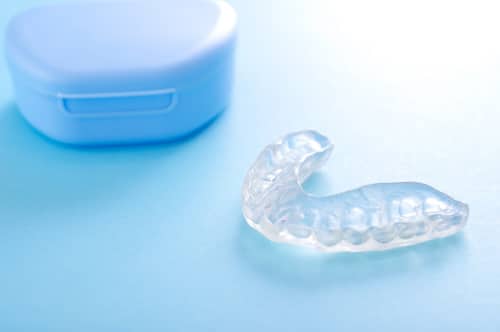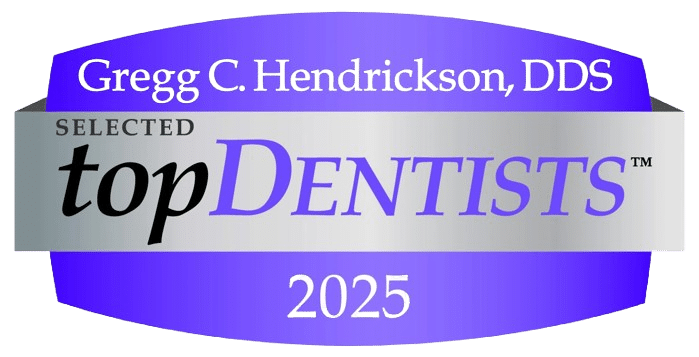
Mouthguards serving Henderson & Las Vegas, NV
Mouthguards are dental appliances that cover your teeth. Most mouthguards are used on your upper teeth. There are three main reasons dentists recommend mouthguards. Each type of mouthguard is designed to achieve a specific goal.
- Bruxism or Grinding Your Teeth: Wearing a mouthguard will protect your teeth when you grind and clench your jaw. Over time, those two habits have a disastrous effect on your health and teeth. Grinding and clenching will wear down your teeth until your teeth or dental implant needs restoration. A mouthguard is the perfect way to protect your teeth from these uncontrollable habits. Mouthguards used for these purposes are called nightguards because they are worn at night.
- Snoring and Sleep Apnea Devices: Although sleep apnea and snoring devices look like mouthguards they are called Sleep Apnea devices. These devices help keep your airway open at night while you are sleeping. These devices prevent you from having episodes of not breathing while you sleep. These devices adjust your jaw position to improve airflow during sleep. They are FDA-approved for this use. For more information on sleep apnea click here.
- Sports Mouthguards: Safeguarding your teeth during intense physical activities (just like the professionals do) is the best gift you can give yourself or your child. Your permanent teeth are a “one and done”. If you break or knock out a tooth, you are looking for an emergency dentist and an emergency fix which can be very costly and time-consuming. Mouthguards easily protect your teeth from these types of injuries. Custom ones are best, but you can also purchase over-the-counter sports mouthguards. Don’t forget this important piece of sports equipment!
Should I have a sports mouthguard?
Did you know that according to the American Dental Association, 10-20% of all sports-related injuries are to the face, jaw, or mouth? If you or your child play any of the following sports, the American Dental Association recommends a mouthguard during practice and competition: acrobats, basketball, boxing, field hockey, football, gymnastics, handball, ice hockey, lacrosse, martial arts, racquetball, roller hockey, rugby, shot putting, skateboarding, skiing, skydiving, soccer, squash, surfing, volleyball, water polo, weightlifting, and wrestling. Other experts include baseball and softball infielders on that list. They further recommend the mouthguard be worn during all practices and competitions.
What is Bruxism? Can I tell if I do this?
Bruxism, the medical term for teeth grinding and jaw clenching, is a subconscious habit that can lead to extensive dental damage. Bruxism can occur during the day but is more likely to occur at night when you are sleeping.
Have you woken up to a sore jaw or a dull headache? A sore jaw and dull headache are primary symptoms of bruxism along with other symptoms including earaches, sore jaw muscles, tinnitus, pain, and difficulty opening and closing your mouth. If you experience these symptoms, come in for an exam, and your dentist can discern if you are grinding your teeth. A mouthguard is a simple solution to a serious problem.
What is Sleep Apnea? How do I know if I have Sleep Apnea?
Sleep Apnea is a sleep disorder where you stop and start breathing throughout the evening. These events can happen as little as 5 times per hour and as many as over 30 times per hour. Sleep Apnea is a serious condition that requires medical intervention. Please read more about sleep apnea here.
It is almost impossible to tell if you have sleep apnea which is why our office always recommends a sleep study. Sleep studies can be done through a Sleep Center or with a take-home test. Symptoms that may indicate you have sleep apnea include headaches in the morning, fatigue during the day, depression, forgetfulness, and being easily irritated.
The good news is sleep apnea is easily corrected with a CPAP machine or oral appliance that looks similar to a mouthguard. These oral appliances are FDA approved especially for this use. For more information on Sleep Apnea, call our office and schedule an appointment with our Sleep Apnea specialist Dr. Le.
A Custom Mouthguard Is an Investment in Your Dental Health
At Comprehensive Dental Care in Henderson, we strongly advocate for the use of custom mouthguards over store-bought options for superior protection and comfort. Custom mouthguards, tailored specifically to fit the unique contours of your mouth, provide optimal safety and efficiency in preventing dental injuries during sports or from teeth grinding (bruxism). Unlike one-size-fits-all solutions found in stores, a custom mouthguard made by Dr. Hendrickson and our skilled team ensures a perfect fit that won’t slip or cause discomfort.
This precise fit not only enhances protection but also allows for better breathing and communication, which are critical during athletic activities. Additionally, because they are designed to accommodate your specific dental structure, custom mouthguards can prevent the long-term dental issues often associated with poorly fitting guards, making them a worthwhile investment for both your dental health and overall well-being.
In closing, mouthguards have an important task in your mouth, protecting your beautiful teeth from injury, wear and tear and helping you breathe at night. Schedule an appointment with your dentist if you are interested in finding out more about these mouthguards.


